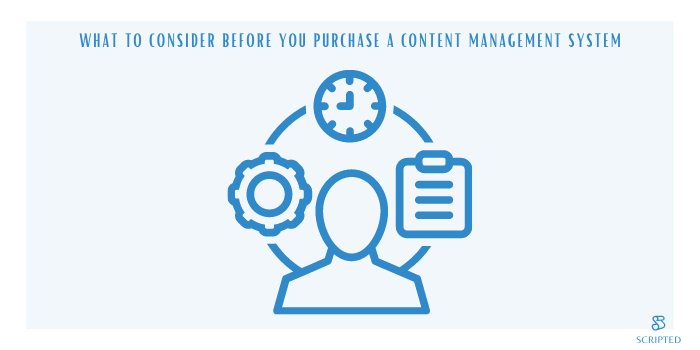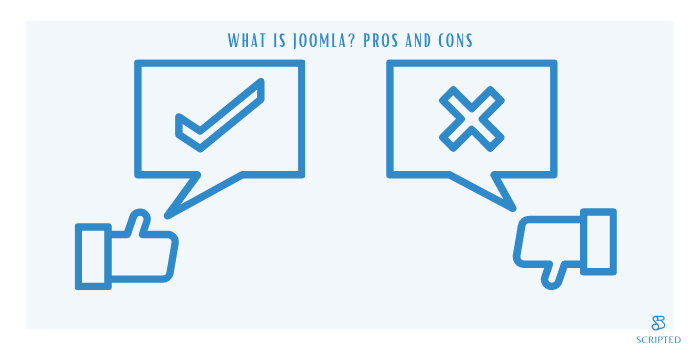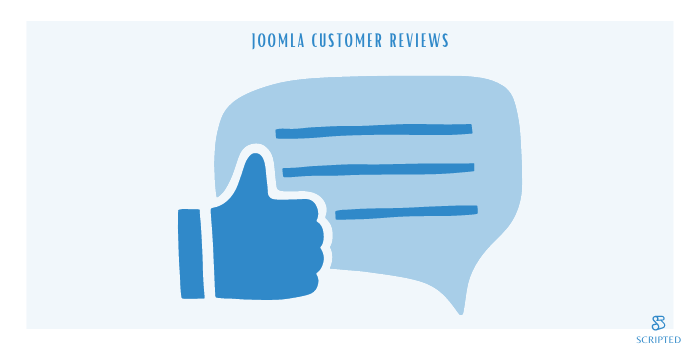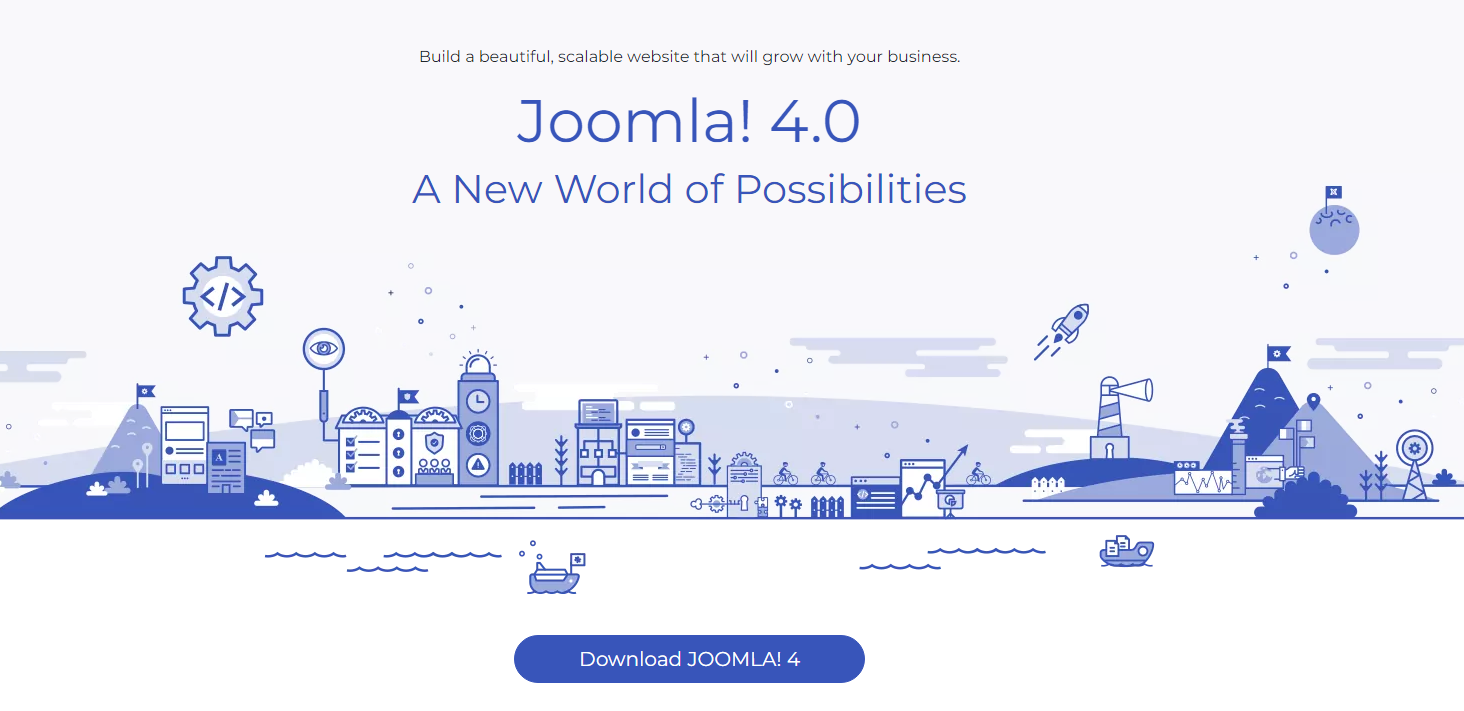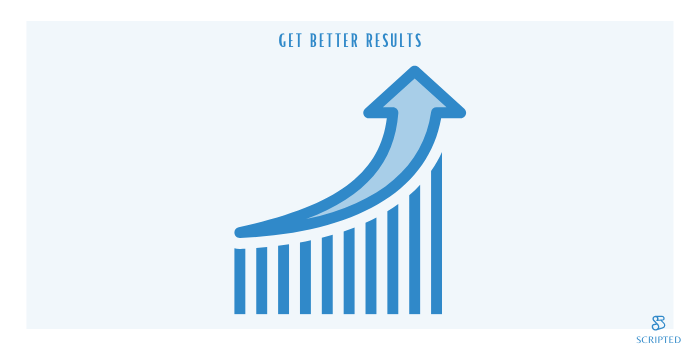- Blog Home
- Marketing Agencies
- Ciara Antolini
- Joomla Tool Review | Scripted
Joomla Tool Review | Scripted
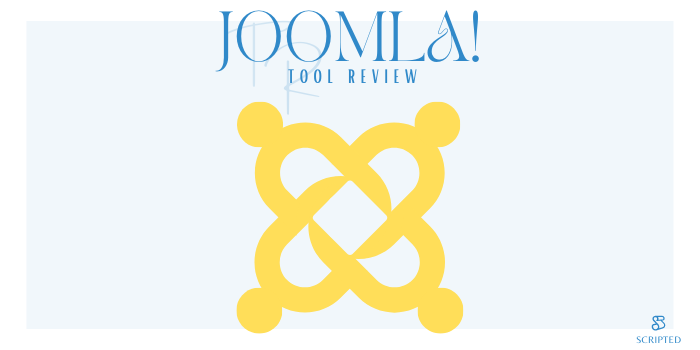
More than half of all websites online are made using a Content Management System. CMS's are very useful if you have limited experience and/or technical knowledge in website building. But with so many options, which one is better for you?
Joomla is the second most popular CMS platform behind WordPress. Using Joomla articles for blogging is a workable choice, notably for DIY people. Although the setup takes longer for including components for commenting, social media, or newsletter integration, designing Joomla articles should be a straightforward experience for producers, making it more straightforward to support content.
In this tool review of Joomla, you will see everything you need to know about the platform, which is:
- What to Consider Before You Purchase a Content Management System
- What Is Joomla? Pros and Cons
- Joomla Features
- Joomla Customer Reviews
- Joomla Pricing
- Alternatives to Joomla
What to Consider Before You Purchase a Content Management System
Most people only consider editing, putting photos, publishing, and managing posts when they consider a content management system. They think incorrectly that all content management systems do this, and they miscalculate the complete functionality of a CMS.
Not all platforms let users keep posts the way they think it does. CMSprincipally categorizes individual posts based on date and time. This control on functionality enables the user interface to be straightforward and intuitive. In other cases, most business owners or writers will find these circumstances daring.
As with every other software on the internet, many content management systems are free. Their basic version, that is. If you want complete management, you will have to pay for it, and the best templates will cost you. Otherwise, you may have to operate with a joomla.com site domain. Therefore, you will need to acquire a domain and link it to your website.
A content management system provides content integration through your website swiftly and quickly. CMS sites are integrated with dynamic web content, rather than static. This allows information to be updated or repurposed as desired. With a CMS, your information isn’t coded into web pages but obtained from databases that allowed users can easily maintain.
Therefore, you want a CMS that provides versatility in the way you save and publish content. For instance, can you search and recover articles in reversed chronological order? Do you have a calendar to illustrate events on? Can you get the new comments on posts and promote them on the home page? A versatile CMS will assist you to carry out all that.
What Is Joomla? Pros and Cons
Introduced in 2005, Joomla was created to be the intermediate platform in the CMS marketplace. It is an open-source content management system that assists you in developing dynamic websites and applications. Joomla is formulated in PHP and uses MySQL database while applying object-oriented programming procedures that can be set up with a one-click install through a web hosting control panel.
Joomla uses Model-View-Controller (MVC) design architecture. It first analyzes the URL to figure out which component will handle the request. The design contains the data handled by the component. It is also its responsibility to update the database when and where needed. The view is accountable for providing the output. It can contact the model to get the needed information. After the view has produced the output, the component gives back the control to the Joomla framework, which then executes the template.
Joomla Tool Pros
- Great for beginners
- Very SEO friendly
- Caching and performance mechanisms
- Great for e-commerce
- Multiple extensions
- Outstanding premium template
Joomla Tool Cons
- Requires more expertise in CMS
- Lacks backward compatibility
- Few free extensions
- The free templates are not impressive
Joomla Features
As said previously, Joomla is an open-source CMS that helps you build dynamic and sturdy websites and applications. Its interactive interface helps you use its features to the maximum. However, what are Joomla best features?
Free to Use
Joomla is developed in open-source so that everybody can download it for free. As explained above, PHP and MySQL in Joomla make it feasible for many volunteers to maintain their participation in improving the code and designing new extensions. The commercial CMS license could quickly cost you tens of thousands of dollars if you create many sites every year.
You'll need to hire people to improve the CMS and its extensions. You will wait for months or years for your CMS to be available. However, if you download Joomla now, you can spontaneously own a website and easily construct it all at free cost.
Great for E-Commerce
Joomla is great for establishing an online store. It has many shopping cart extensions that let you design an e-commerce website easily and effortlessly. Shopping carts need to be safe and need to circumvent spam. On the login form, you can add CAPTCHA and defend your store against spammers.
The backup extension enables you to back up your e-commerce store. There are many free and pro-e-commerce Joomla templates with charming designs that can be conveniently customized. Joomla includes everything you require to keep your website reliable, including tracking your website analytics, social marketing, affiliate marketing, and SEO optimization. Joomla also owns an email marketing addition that can automate your email campaign.
Safe, Fast, and Easy to Use for Editing
Joomla is more reliable to use for writing a page on your website. When you are writing any of the articles or sections, it will lock that so that no one else can write the same content to avoid conflicts. Joomla comes with a robust content editor. TinyMCE, which makes it easy for you to update content. You don't have to invest in any extensions to have these publishing tools. They are by default in your Joomla editor.
It is also easy to hunt for the content you desire to edit with the article manager tool. You can limit your results by several criteria such as status, tag, category, and language. Anyone with PHP expertise can change the core of Joomla. Joomla's core code is typed acutely, so it is straightforward to update it. PHP is the primary programming language applied in building Joomla. It is required to change the code of Joomla to enhance your site. Still, if you change the core code, you can no longer upgrade to Joomla.
Joomla Customer Reviews
Joomla tool users' reviews are positive, with many people loving its content management platform and how intuitive it is to build and manage great websites. Here are a few reviews:
Joomla! is adequate for working on website development; we use it frequently, which has helped us save time and effort while getting the most creative websites. We have benefited from each tool and its default templates that have streamlined the construction of websites remarkably; it has many extensions that help us achieve excellent results.
- Sergey Gvozdetskiy, Cleveroad
My marketing has utilized Joomla! to build a website. There wasn't much of a learning curve and we were pleasantly surprised with its easy of use, convenience, and availability of templates. We found there wasn't much technical knowledge required and we've found it to be one of the best CMS platforms in terms of simplicity.
- Tory Robinson, Orasi Software
Joomla Pricing
An enormous benefit of Joomla is that it is an open-source platform; hence, its basic version is free. Therefore, you lose nothing trying it out to see how it can help you and/or your business.
Alternatives to Joomla
Even though Joomla is a wonderful platform, it may not fit your needs and may not work for you depending on your level of technical expertise. Here are two other CMS platforms that could help you.
WordPress
Joomla has more integrated features compared to WordPress, so that site owners can search less for investing in add-ons to generate dynamic web projects than they would on WordPress. However, more integrated features mean it will take longer for users to discover the platform and develop their website. Also, Joomla users who need to install an extension will have more trouble than WordPress users who can install a plugin.
Drupal
Drupal expects users to have more expertise in HTML, CSS, and PHP, thus making it more powerful than Joomla. Drupal is generally the go-to for large corporations and government agencies with a devoted team of technical experts. Other types of companies and users with less coding expertise turn to Joomla. Joomla’s built-in multilingual support and advanced user and content management options make it ideal for smaller institutions.
Get Better Results
With Scripted, your company can enjoy a budding online presence that goes far beyond--stretching across social platforms and bringing people back to your own website where you can generate more leads organically, without the need for paid ads or aggressive marketing tactics. Interested in learning more about how content can transform the way your company does business? Get to know us.
